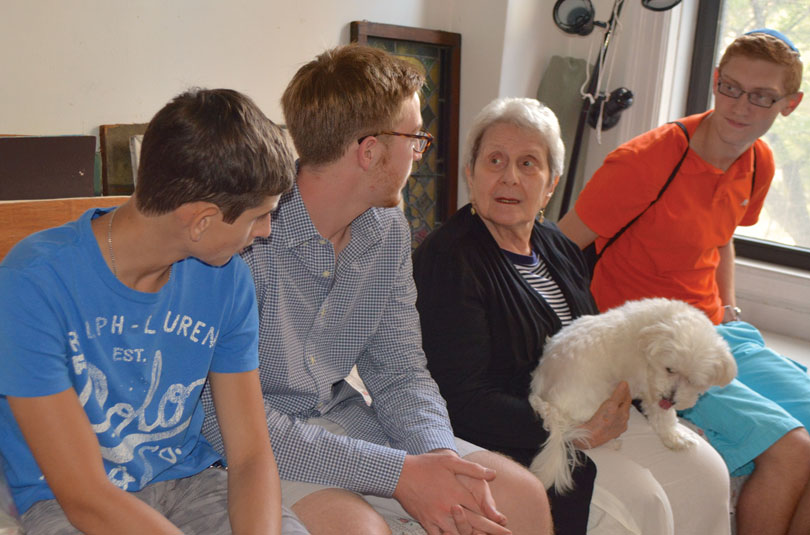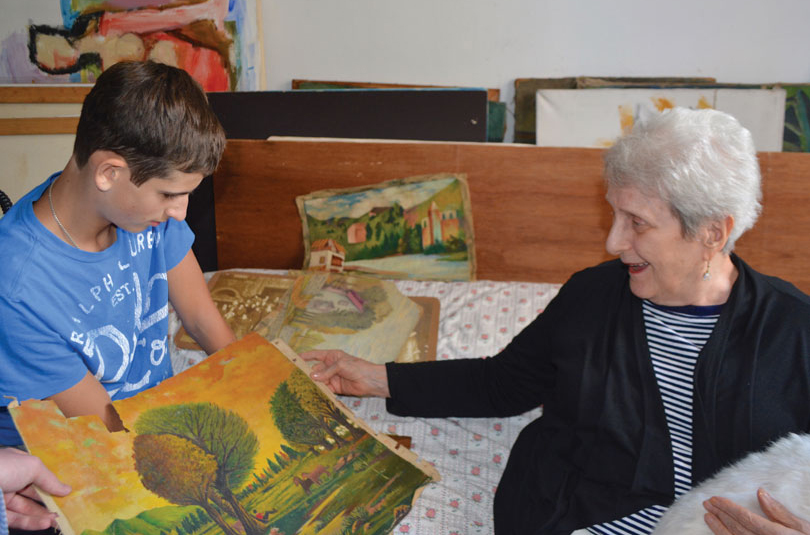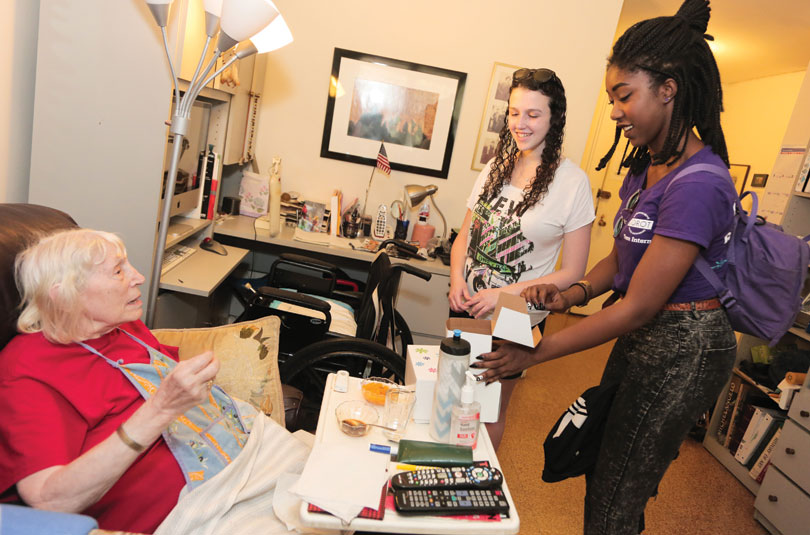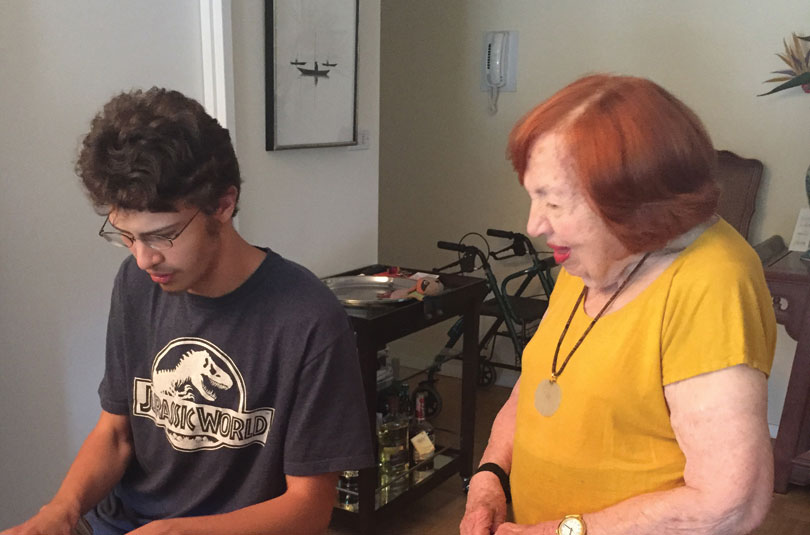
lives
BRIDGING
GENERATIONS,
BUILDING JEWISH LIVES
by AYALON ELIACH
W en I told people that I had accepted a position as the rabbinic counselor for a summer internship program in which teenagers volunteered to visit the elderly, I was met with incredulity. The shock was not that I would take such a job, but rather that any high school student would sign up. Why, people asked and I wondered cynically as well, would any teenager choose to spend the summer helping older adults without being paid for their work?
While I don’t know what motivated every applicant to DOROT’s Jewish Summer Teen Internship Program (we receive more than 10 applications for each spot), working with the interns taught me that although the teenagers were not paid for their time, they received a huge return on their investment. As an ancient Jewish teaching suggests, the giver often walks away with more than the recipient (Vayikra Rabba 34:8).
On the most basic level, the teen interns learned how to work in an office environment. While seemingly mundane, such responsibilities provided an invaluable understanding of organizational culture. As they spent hours every day in the DOROT office and worked with its various departments, the interns learned from the examples of those around them how to excel when they enter the workforce.
In addition to learning office decorum, the interns developed a wide variety of tangible skills. Those who worked on the internship’s documentary film-making project learned filming, editing and production skills from some of the most talented filmmakers in New York. I was amazed to see the quality of the short films they produced over only four weeks.



Other interns focused more heavily on their facilitation skills. Some led weekly conference calls in which they taught seniors about Jewish humor. Others led in-person, intergenerational classes on Jewish perspectives on issues in the news. All became more adept at preparing outlines for teaching, leading group conversations and balancing between teaching and taking questions and comments. By the end of the summer, I rarely had to step in to control the flow of the classes.
The biggest takeaways I saw, however, were not the many skills that the interns developed, but the new ways in which they began to relate to older adults, to each other and to the Jewish tradition.
Almost every day, the interns visited seniors in their homes. I had the privilege of debriefing with the teens after their visits and was amazed at the transformations that I saw. At the beginning of the summer, some felt very uncomfortable talking with any stranger for an hour, let alone with someone 60, 70 or even 80 years older than them. Others felt more at ease, but still felt a wide gulf between themselves and the seniors they were visiting.
After four weeks and more than a collective 175 visits, I was amazed at the difference in the interns’ descriptions of their visits. They asked about the possibility of visiting the same people again; they told me about the unexpected things they learned about the seniors’ lives; and they asked for the opportunity to do more visits in their already packed days. Every teaching I had ever learned about Judaism’s emphasis on respecting the elderly could not compare to the ways in which these teens so naturally learned to live these lessons through their visits.
There were major transformations in their interactions with one another as well. On the first day of orientation, I sat outside our conference room as the teens arrived. The silence coming through the door was deafening. I was not surprised though. The 20 interns came from as many different high schools and ranged in age from 14 to 18. They also came from incredibly diverse Jewish backgrounds. Some attended yeshivah day schools; others had periodically attended Hebrew school; and a full 20 percent had never engaged formally with Jewish education and had not had a bar or bat mitzvah ceremony. There was very little common ground between them.
Over four weeks, those divisions began to crumble. Friendships developed across differences of age, school and Jewish background. The silence from that first day turned into constant chatter. After our closing ceremony at the end of the summer, many interns asked their parents if they could go to dinner together instead of returning home.
In developing these relationships, the teens did not just learn about each other; they were exposed to entirely new perspectives on the Jewish tradition. At least once a week we learned Jewish texts that addressed the big issues the teens were confronting: companionship, isolation, stereotyping, duty, kindness, the aging process and wisdom. In exploring these texts, the teens each offered their unique views informed by their backgrounds; and they taught each other just how many different ways there are to approach the Jewish tradition — that there are indeed “70 faces to the Torah.”
That learning was not limited to our formal gatherings. I regularly overheard interns asking each other about the reasons for their respective observance or nonobservance. I heard intense, yet respectful, exchanges about the meaning and importance of different types of kosher observance. I was reminded consistently of the expansiveness of learning that can take place in a truly pluralistic environment.
When I look back at the months before I started working at DOROT, I have difficulty inhabiting the mindset that caused me to question why teens would want to volunteer at DOROT during their summer vacation. After serving as the rabbinic counselor this past summer, the answer seems so obvious. ■
Ayalon Eliach is the Rabbinic Educator for DOROT’s Jewish Summer Teen Internship Program. He is a rabbinical student at Hebrew College and Cooperberg-Rittmaster Rabbinical Intern at Congregation Beit Simchat Torah. Ayalon holds a BA in Religious Studies from Yale University and a JD from Harvard Law School.
| PREVIOUS ARTICLE | NEXT ARTICLE |